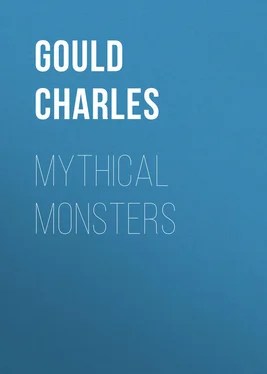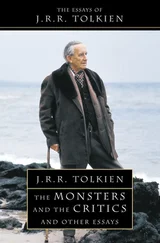Charles Gould - Mythical Monsters
Здесь есть возможность читать онлайн «Charles Gould - Mythical Monsters» — ознакомительный отрывок электронной книги совершенно бесплатно, а после прочтения отрывка купить полную версию. В некоторых случаях можно слушать аудио, скачать через торрент в формате fb2 и присутствует краткое содержание. Жанр: Мифы. Легенды. Эпос, Природа и животные, foreign_antique, foreign_prose, на английском языке. Описание произведения, (предисловие) а так же отзывы посетителей доступны на портале библиотеки ЛибКат.
- Название:Mythical Monsters
- Автор:
- Жанр:
- Год:неизвестен
- ISBN:нет данных
- Рейтинг книги:5 / 5. Голосов: 1
-
Избранное:Добавить в избранное
- Отзывы:
-
Ваша оценка:
- 100
- 1
- 2
- 3
- 4
- 5
Mythical Monsters: краткое содержание, описание и аннотация
Предлагаем к чтению аннотацию, описание, краткое содержание или предисловие (зависит от того, что написал сам автор книги «Mythical Monsters»). Если вы не нашли необходимую информацию о книге — напишите в комментариях, мы постараемся отыскать её.
Mythical Monsters — читать онлайн ознакомительный отрывок
Ниже представлен текст книги, разбитый по страницам. Система сохранения места последней прочитанной страницы, позволяет с удобством читать онлайн бесплатно книгу «Mythical Monsters», без необходимости каждый раз заново искать на чём Вы остановились. Поставьте закладку, и сможете в любой момент перейти на страницу, на которой закончили чтение.
Интервал:
Закладка:
The beautiful mythology of the Greek nation, comprising a pantheon of gods and demigods, benign for the most part, and often interesting themselves directly in the welfare of individual men, was surely due to, or at least greatly induced by, the plastic influences of a delicious climate, a semi-insular position in a sea comparatively free from stormy weather, and an open mountainous country, moderately fertile. Again, the gloomy and sanguinary religion of the Druids was doubtless moulded by the depressing influences of the seclusion, twilight haze, and dangers of the dense forests in which they hid themselves – forests which, as we know from Cæsar, spread over the greater part of Gaul, Britain, and Spain; while the Viking, having from the chance or choice of his ancestors, inherited a rugged seaboard, lashed by tempestuous waves and swept by howling winds, a seaboard with only a rugged country shrouded with unsubdued forests at its back, exposed during the major portion of the year to great severity of climate, and yielding at the best but a niggard and precarious harvest, became perforce a bold and skilful mariner, and, translating his belief into a language symbolic of his new surroundings, believed that he saw and heard Thor in the midst of the howling tempests, revealed majestic and terrible through rents in the storm-cloud. Pursuing our consideration of the effects produced by climatic conditions, may we not assume, for example, that some at least of the Chaldæans, inhabiting a pastoral country, and being descended from ancestors who had pursued, for hundreds or thousands of years, a nomadic existence in the vast open steppes in the highlands of Central Asia, were indebted to those circumstances for the advance which they are credited with having made in astronomy and kindred sciences. Is it not possible that their acquaintance with climatology was as exact or even more so than our own? The habit of solitude would induce reflection, the subject of which would naturally be the causes influencing the vicissitudes of weather. The possibilities of rain or sunshine, wind or storm, would be with them a prominent object of solicitude; and the necessity, in an unfenced country, of extending their watch over their flocks and herds throughout the night, would perforce more or less rivet their attention upon the glorious constellations of the heavens above, and lead to habits of observation which, systematized and long continued by the priesthood, might have produced deductions accurate in the result even if faulty in the process.
The vast treasures of ancient knowledge tombed in the ruins of Babylon and Assyria, of which the recovery and deciphering is as yet only initiated, may, to our surprise, reveal that certain secrets of philosophy were known to the ancients equally with ourselves, but lost through intervening ages by the destruction of the empire, and the fact of their conservancy having been entrusted to a privileged and limited order, with which it perished. 33
We hail as a new discovery the knowledge of the existence of the so-called spots upon the surface of the sun, and scientists, from long-continued observations, profess to distinguish a connection between the character of these and atmospheric phenomena; they even venture to predict floods and droughts, and that for some years in anticipation; while pestilences or some great disturbance are supposed to be likely to follow the period when three or four planets attain their apogee within one year, a supposition based on the observations extended over numerous years, that similar events had accompanied the occurrence of even one only of those positions at previous periods.
May we not speculate on the possibility of similar or parallel knowledge having been possessed by the old Chaldæan and Egyptian priesthood; and may not Joseph have been able, by superior ability in its exercise, to have anticipated the seven years’ drought, or Noah, from an acquaintance with meteorological science, to have made an accurate forecast of the great disturbances which resulted in the Deluge and the destruction of a large portion of mankind? 34
Without further digression in a path which opens the most pleasing speculations, and could be pursued into endless ramifications, I will merely, in conclusion, suggest that the same influences which, as I have shown above, affect so largely the very nature of a people, must similarly affect its traditions and myths, and that due consideration will have to be given to such influences, in the case of some at least of the remarkable animals which I propose to discuss in this and future volumes.
Chronological List of some Authors writing on, and Works relating to Natural History, to which References are made in the present Volume; extracted to a great extent, as to the Western Authors, from Knight’s “Cyclopædia of Biography.”
The Shan Hai King – According to the commentator Kwoh P’oh (A.D. 276-324), this work was compiled three thousand years before this time, or at seven dynasties’ distance. Yang Sun of the Ming dynasty (commencing A.D. 1368), states that it was compiled by Kung Chia (and Chung Ku?) from engravings on nine urns made by the Emperor Yü, B.C. 2255. Chung Ku was an historiographer, and at the time of the last Emperor of the Hia dynasty (B.C. 1818), fearing that the Emperor might destroy the books treating of the ancient and present time, carried them in flight to Yin.
The ’Rh Ya – Initiated according to tradition, by Chow Kung; uncle of Wu Wang, the first Emperor of the Chow dynasty, B.C. 1122. Ascribed also to Tsze Hea, the disciple of Confucius.
The Bamboo Books – Containing the Ancient Annals of China, said to have been found A.D. 279, on opening the grave of King Seang of Wei [died B.C. 295]. Age prior to last date, undetermined. Authenticity disputed, favoured by Legge.
Confucius – Author of Spring and Autumn Classics, &c., B.C. (551-479).
Ctesias – Historian, physician to Artaxerxes, B.C. 401.
Herodotus – B.C. 484.
Aristotle – B.C. 384.
Megasthenes – About B.C. 300. In time of Seleucus Nicator. His work entitled Indica is only known by extracts in those of Strabo, Arrian, and Ælian.
Eratosthenes – Born B.C. 276. Mathematician, Astronomer, and Geographer.
Posidonius – Born about B.C. 140. Besides philosophical treatises, wrote works on geography, history, and astronomy, fragments of which are preserved in the works of Cicero, Strabo, and others.
Nicander – About B.C. 135. Wrote the Theriaca , a poem of 1,000 lines, in hexameter, on the wounds caused by venomous animals, and the treatment. Is followed in many of his errors by Pliny. Plutarch says the Theriaca cannot be called a poem, because there is in it nothing of fable or falsehood.
Strabo – Just before the Christian era. Geographer.
Cicero – Born B.C. 106.
Propertius ( Sextus Aurelius ) – Born probably about B.C. 56.
Diodorus Siculus – Wrote the Bibliotheca Historica (in Greek), after the death of Julius Cæsar (B.C. 44). Of the 40 books composing it only 15 remain, viz. Books 1 to 5 and 11 to 20.
Juba – Died A.D. 17. Son of Juba I., King of Numidia. Wrote on Natural History.
Pliny – Born A.D. 23.
Lucan – A.D. 38. The only work of his extant is the Pharsalia , a poem on the civil war between Cæsar and Pompey.
Ignatius – Either an early Patriarch, A.D. 50, or Patriarch of Constantinople, 799.
Isidorus – Isidorus of Charaux lived probably in the first century of our era. He wrote an account of the Parthian empire.
Arrian – Born about A.D. 100. His work on the Natural History, &c. of India is founded on the authority of Eratosthenes and Megasthenes.
Читать дальшеИнтервал:
Закладка:
Похожие книги на «Mythical Monsters»
Представляем Вашему вниманию похожие книги на «Mythical Monsters» списком для выбора. Мы отобрали схожую по названию и смыслу литературу в надежде предоставить читателям больше вариантов отыскать новые, интересные, ещё непрочитанные произведения.
Обсуждение, отзывы о книге «Mythical Monsters» и просто собственные мнения читателей. Оставьте ваши комментарии, напишите, что Вы думаете о произведении, его смысле или главных героях. Укажите что конкретно понравилось, а что нет, и почему Вы так считаете.











